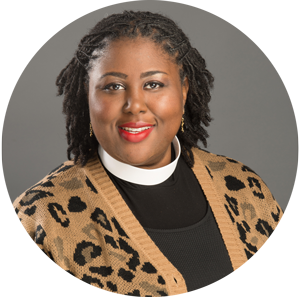Doula Profile: Christina Marthield Montgomery
CHRISTINA MARTHIELD MONTGOMERY

Christina is “a Black, disabled, fat, femme lesbian” who received her master of divinity in May 2021 from the Lutheran School of Theology at Chicago. Although she is awaiting ordination, she currently serves in a pastoral capacity at First Lutheran Church of the Trinity in the Bridgeport neighborhood of Chicago. She lives in Hyde Park, Chicago, overlooking Lake Michigan with her fiancée, Danielle, and her son, Ezekiel. She loves to cook, knit, crochet, paint, cross-stitch, sing, and collect elephant items.
Q&A with Christina
When and why did you decide to become an end-of-life doula?
My draw toward doing ministry for the dying and bereaved began in early 2015 after the death of my great-nephew, Jayveon. He was the first baby born in my extended family in more than a decade—my 21-year-old niece, Dijah’s, first. My whole family was incredibly excited. I had taken some birth doula classes, and my niece had asked me to be at the birth to support her. She was doing everything natural, we had a birth plan, and even a plan to save her placenta after it was naturally delivered!
When she went into labor, she labored a whole day, and I was right by her side. The next day, she gave birth to this beautiful boy that the doctor plops right up to her chest. Excellent. Then the next thing we know, the doctor pulls the placenta out, cuts the cord, and the baby was grabbed away, screaming to the team in the room. He was born with VACTERL association.
He was flown to Riley Children’s Hospital, and for the next 60 days he underwent surgery after surgery, test after test, in an effort to keep him alive. Ultimately, he was just too sick, and my niece made the brave decision to let him go.
Between coming to terms with my own chronic, progressive health (I have multiple sclerosis) condition and watching my family grieve Jayveon, I became obsessed with death, dying, and mortality. I enrolled in seminary that fall. I believe it was in my second year that I took the elective course Caring for the Dying and Bereaved, and that was when I first learned of end-of-life doulas. From that moment I wanted to take the training and do the work, but I decided to wait until after I finished school in 2021.
How long have you been doing this type of work?
Formally, I’ve been doing doula work since December 2021, but I have been accompanying dying people and their families in an active way since 2015.
What type of environment do you work in?
Prior to the COVID-19 pandemic, I visited patients in hospitals and at homes. Due to safety concerns, my work has primarily moved to Zoom meetings and by phone. My clientele has primarily been African Americans and people who identify as LGBTQ+.
What do you do before you meet with a new client?
Breathe. It may sound simple, but taking time to close my eyes and take a few centering breaths is the best thing to do before entering every interaction. It gives me a chance to clear my mental slate, do a physical inventory, and go over my client checklist in my head.
Can you share a short anecdote or insight that changed you?
Shortly after I began the formal training, the father of one of my colleagues began to actively die. While I was headed to a retirement party with my partner, this colleague, who I have only known via Zoom for a few months, called me for advice on how to support her father as he transitioned. She began by telling me all the terrible religious things that the hospital chaplain had done for her nonreligious father and then asked me how to balance the varying needs of the family members and caretakers. I was caught off guard. I asked a few questions about the family and then spoke from my gut, offering to come and sit with them at any point if they desired. They never did, but I did receive a lovely card from her mom thanking me for my help.
Who has been one of your teachers or mentors?
One of my greatest mentors is Rev. Dr. Kathleen (Kadi) Billman. She is not a doula, but she is the one who introduced me to the term. She is also the person who encouraged me to interrogate my interest in death and dying and saw value in my fascination with darkness. Without her I would not have pursued this training.
What do you wish you had known when you started as a doula?
Finding clients is tough. Many people don’t know what we do or don’t have the money. Even if you are doing pro bono work, they aren’t ready/willing to open the conversation because they fear the expense. I had to learn how to provide care without getting bogged down in the fee conversation.
Do you have any words of encouragement for fellow doulas?
Your presence with a dying person and their family is better than no presence at all. You may not know what to say the first or second time, but it gets easier.
What is your dream for your practice or doulas in general?
I wish all people knew that doulas existed and what our roles are in the birth and death process. A well-trained doula brings so much to every room they enter. Once we become more commonplace in the medical-industrial complex, we could effect real change for people. Beyond just making sure the last moment meets the dying person’s wishes, through our presence we could reshape elder care, reduce the frequency of dependent funeral debt, and make dying well a natural part of life.
Contact Christina:
Web: Accompany \\ Email: [email protected]
